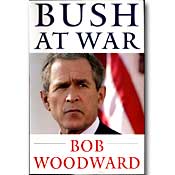
T he title of Bob Woodward’s new book, Bush at War, pretty much sums up the choice this country made about its governance last month, in much the same way a similarly simple phrase, “It’s the economy, stupid,” won in ’92 for Bill Clinton. Bush’s ability to control and focus the emotions produced by September 11 has changed our politics in ways that will become even clearer come January. For all the built-in drama, this is not a Cuban Missile Crisis moment; there’s not a brink in sight. The book is essentially about an endless series of fairly open-ended meetings in the aftermath of September 11 among a small group, weighing options, sniping, infighting, ass-covering, punctuated by humor and moments of camaraderie. It’s a book, in other words, about an office, albeit one that happens to be oval.Woodward made his reputation by shining a light into the dark places of our government. Now, 30 years later, the porch lights are on, and they’ve set out a buffet. He’s a civilized guest, one of them, in ways that recall what his old boss Ben Bradlee was to John F. Kennedy. Most of his subjects, far from being adversaries, are full partners. He’s constantly being spun—that’s part of his job description. Those vivid, churning weeks after September 11, wracked by tears and sirens and smoke, are largely absent here. One keeps matching one’s own experience to what’s on the page, looking for shared milestones. Probably because Woodward’s many sources have had a year to justify and rationalize, Bush’s terrible first couple of days—Louisiana? It still doesn’t seem like such a good idea—pass without a hitch. The most captivating player is cheerful, demonic Donald Rumsfeld. There’s Socratic method to his madness. It’s sometimes hard to discern a purpose (other than ass-covering) beneath his endless questioning and bureaucratic koans, but in an office, entertainment can be its own reward. Colin Powell is his natural adversary, equally shrewd about words but with a completely different ethic about how they should be used. His caution engenders suspicion. His only real ally is Condoleezza Rice, whose belief in consensus and process seem essential in this testosterone-overloaded group. Then, of course, there’s Bush the Warrior. Prior to September 11, two of his most salient claims to fame had been his long vacations and his slim margin of victory, if victory it was. This book doesn’t necessarily suggest that he’s grown on the job. Rather, his palette of virtues—genuineness, bravado, a sense of his limits—suited him to be the instrument of the country’s pain and rage and hunger for revenge. He leads meetings, sets deadlines, exhorts the troops, and keeps an Al Qaeda scorecard in his drawer—the Oval Office is never free from one adolescent activity or another. Bush’s leadership is “is driven by a secular faith in his instincts,” Woodward writes. The vision thing? Not exactly. As the bombing drifts on, the turf war between George Tenet’s CIA and Rumsfeld’s Defense Department heats up in a particularly alarming way. “I’m not in charge.” “Well, we thought you were in charge.” The press begins to talk quagmire. Bush’s men scapegoat Mohammed Fahim, the Northern Alliance commander, who seems to show a General McClellan–like caution in attacking. The strong impression is that the decision to bomb the Taliban front lines, which quickly won the war, was made from the bottom up rather than the top down—it was almost an accident, not a stroke of war-room genius. Woodward shows his authorial hand in the book’s coda, when he presents Rumsfeld with information Rumsfeld didn’t think he had. Rumsfeld curses—God damn, the smoking gun! Woodward makes a joke about those famous missing Nixon-tape minutes. It’s a gotcha moment, but also an anticlimax, one consummate Washington sportsman one-upping another. This is a war game, not a war. The other war, the one at home, with its evolving revision of civil liberties, is largely absent from this book (this must have been a conscious choice, and an unfortunate one). Woodward observes that Bush became fascinated with the NSA ability to tap telephones. “Listen to every phone call,” he said, “and close them down and protect the innocents.” That’s the kind of ends-justifies-means calculus that could have us living in Orwell territory before you can say “Un-American Activities.” This is a new form of Afghanistan blowback—it’s a danger we know all too much about.
Bush at War
By Bob Woodward. Simon and Schuster; 376 pages; $28.